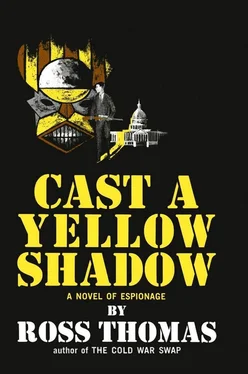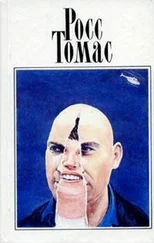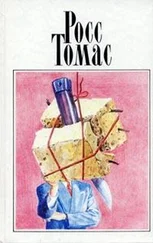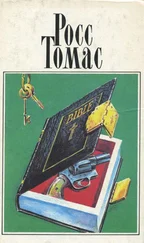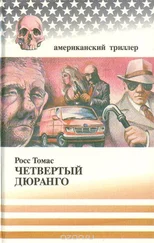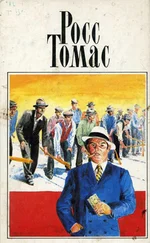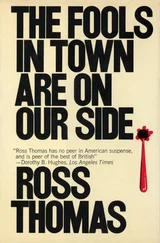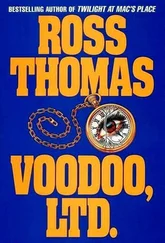I rested the telephone on my shoulder and rolled down the window and threw my cigarette out. I had to turn on the key to roll down the window. They were electric.
Magda stirred in the corner. “Now?” she asked. “Is this when I get my briefing?”
“Now,” I said. “The little blonde is from the same country as Van Zandt. Her father got run over in downtown Washington last week. Her father knew about Van Zandt’s plans to get himself killed. It doesn’t matter now how he found out. The little blonde’s job is to go into the trade mission, and threaten to spill the whole mess. We’re betting that they’ll move her someplace where they can keep her out of sight and out of hearing. We’re betting that they’ll move her to the same place where they’re holding my wife.”
“Padillo,” she said. “It’s got all the nastiness of something he’d propose — using someone else’s neck.”
“If she doesn’t come out in thirty minutes, we go in and get her.”
“We?”
“The four of them and me. You can wait in the car.”
“And if they move her, we follow them. Is that it?”
“That’s it,” I said.
“Then I go up to the door of wherever it is, knock politely, and when it’s opened, I aim a gun at whoever opens it and tell him to open it all the way.”
“I’ll be with you,” I said. “Our four friends will be close by.”
“Then we go in, rescue your wife and Michael’s little blonde thing and that’s it. The curtain descends with me counting the final share of my payment.”
“You’ve got it.”
“Simple,” she said. “Like everything he’s ever done. Complicated, but simple, with someone bound to get hurt.”
“Perhaps.”
“We’ll make a lovely couple going up to that door,” she said. “How do you know they don’t have orders to shoot all callers?”
“I don’t. You can always shoot first.”
“You sound awfully determined.”
“It’s my first wife.”
She looked at me and smiled slightly. “Determined — even for a first wife.”
“You did bring something to shoot with, didn’t you?”
“Yes.”
There wasn’t much conversation after that. I lighted another cigarette and stared at the traffic. Magda curled in her corner of the big seat and tapped her fingers on her purse. After a while, she opened it, took out a compact and inspected her make-up. If she were going calling, she seemed to want to look nice.
“Hardman,” the telephone said. “It’s fifteen till and they comin out the front... Two and Missy... she between ’em... They all gettin in a car — Continental, dark blue... all three in the front seat... it’s backin out... turnin onto Massachusetts and headin away...”
“Which way?” It was Padillo’s voice.
“East... we’re right behind ’em... You got it, Johnny Jay?”
“Got it. We’re comin.”
“I’ll take first tail,” Hardman said. “Then we shift off and you take it.”
“O.K.,” Johnny Jay said. “We rollin on Mass now.”
“They comin your way, Mac.”
“All right,” I said. I started the car and pulled it up to the corner, and pulled down the sun visor. The blue Continental sped by, Boggs at the wheel, Sylvia in the center, Darragh on the other side. They didn’t seem to be doing much talking. The white pickup truck was about fifty feet behind them, Tulip driving. I fell in behind the pickup.
“Where you at, Johnny Jay?” Hardman asked.
“Six blocks this side of the circle,” he said.
“We’re four blocks. I want you to take over at Dupont.”
“I’m comin.”
At Dupont Circle, the Continental turned down Nineteenth. “He’s turnin on Nineteenth, Johnny Jay. I’m goin on to Connecticut.”
“I got him in sight.”
“You take the talkin then.”
I followed the pickup truck as it turned right on Connecticut at Dupont Circle.
“This mother’s movin,” Johnny Jay said. “We’re cross-in M Street... goin straight... Now we’re on R... turnin left on K... Red light at Eighteenth... Now we’re goin... Seventeenth... now Seventeenth and I... made the light... now Pennsylvania and we made that one too... Still on Seventeenth...”
Johnny Jay kept talking as Boggs led him down Seventeenth to the Tidal Basin, up Maine Avenue past what was left of Washington’s waterfront, and then up M Street into the new southwest section of the city.
“I don’t know where this mother’s goin, but he’s headin for home territory now,” Johnny Jay said. “We at M and Van Streets now, baby.”
“He goin past the Navy Yard?” Hardman asked.
“Look like he goin right past,” Johnny Jay said.
“He hit that Navy Yard he can’t turn right till he get to Eleventh. I’m goin to move up on him. You drop back.”
“I’m droppin,” Johnny Jay said.
We were moving down N Street in the southeast section as Hardman talked. At Half Street he turned left and then right on M. I was right behind the pickup and could see the Continental speeding down the double-laned boulevard on M that ran in front of the thirteen-block-long Navy Yard. At Eleventh Street, the Continental pulled over to the right lane, and turned right.
“He goin to Anacostia!” Hardman said. “Shit, man, nobody go there.”
Anacostia was across the river from the rest of Washington and it might as well have been in the next country. There wasn’t much to attract the tourist and the typical northwest Washington resident wasn’t quite sure how to get there if he were ever unlucky enough to have cause to go. It was an area of quiet streets that were turning into a ghetto, but it would take another five years or so for that. At present, it was a mixture, perhaps thirty per cent white and seventy per cent Negro.
“Stick close, gentlemen,” Hardman said, “cause I don’t know this area too well.”
“Who does?” Johnny Jay asked.
We crossed the Eleventh Street Bridge, and turned right. After that I got lost. We were in the briar patch. The Continental turned down a quiet residential street and I drove slowly around the corner and stopped. The pickup followed the Continental down half-a-block. The big white truck with Nineball driving and Johnny Jay beside him with the phone in his hand turned the corner and pulled in up front of me.
I couldn’t see the Continental. Hardman started talking again. “They parked in front of a house, two stories, brick, and they goin in. Missy’s between em. They knockin on the door, somebody openin it, can’t see who, and they’ve done gone in.”
“They get ten minutes,” I said.
“Can you see them, Mac?” It was Padillo’s voice.
“No. The truck’s blocking my view.”
We waited. Magda stirred and opened her purse and looked inside.
“The same two comin out now,” Hardman said. “They gettin in the car. They rollin it now.”
“O.K.,” I said. “The two of us will go up to the door; you be on the sidewalk.”
“Now?” Magda said.
“Now you start earning your money.”
She looked through the window of the car at the cracked concrete sidewalk, the narrow houses that needed paint, and the trees with the last of the year’s leaves clinging as if they had been hung out to dry and forgotten.
“You know,” she said as she pressed the handle of the door, “I think I’m going to earn every cent.”
The house was built on a terrace but the grass had long since given up and disappeared. It was a fifteen-foot-wide row-house with a grey brick veneer. It had a window and a door on the first floor and two windows on the second. A porch with a shingled roof seemed to have been added to the front as an afterthought. Venetian blinds were lowered on the three windows.
Читать дальше
